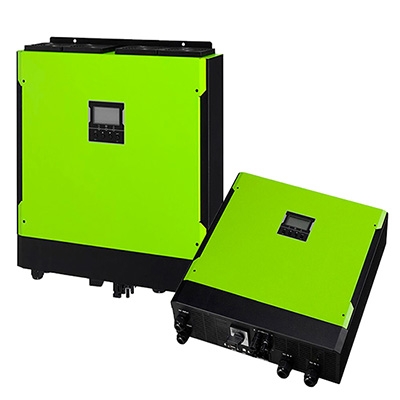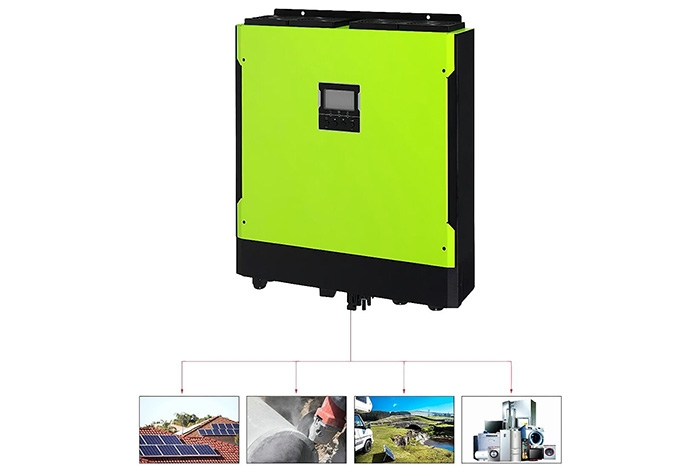A hybrid inverter is a power conversion device capable of converting DC power to AC power, which utilizes several different types of inverter technology, such as hard switching and soft switching, to improve its efficiency and performance. Hybrid inverters not only convert DC power generated by solar panels into AC power for electricity supply but also convert grid power into DC power for storage, thus enabling switching between off-grid and grid-connected modes of operation for solar power systems. Next, inverter.com will briefly introduce you to the meaning and powerful performance of hybrid inverters.
Hybrid Inverter Basics
A hybrid inverter, also known as an energy storage inverter, not only converts DC to AC but also realizes AC to DC conversion as well as rectification of voltage and phase between AC and DC themselves; in addition, a hybrid inverter also integrates intelligent modules such as energy management, data transmission, etc., which is a kind of high-tech electrical equipment. In the energy storage system, a hybrid inverter connects photovoltaic, storage battery, load, grid, and other modules and monitors and manages these modules, it is the heart and brain of the whole energy storage system.
The advantages of hybrid inverters are their high efficiency and flexibility. It can achieve high-efficiency power conversion and optimize energy usage through intelligent control strategies. At the same time, the hybrid inverter also has a variety of protection functions, such as over-voltage protection, under-voltage protection, over-current protection, etc., to ensure the safe and stable operation of the system.
Functions of Hybrid Solar Inverter
Hybrid inverters are useful in the following ways:
1. Energy Conversion: Hybrid inverters convert DC power to AC power so that the DC generated by the solar generator can be connected to the grid. In solar power systems, the inverter converts the DC power generated by the solar panels into AC power for domestic or industrial use. At the same time, when the DC voltage is lower than the grid voltage, the inverter can also convert the grid voltage into DC power that can be stored in batteries to provide power when needed.
2. Energy management: The hybrid inverter is equipped with an intelligent control function that can control and regulate the motor according to variables such as the voltage of the battery pack, the motor's speed, and load to ensure stable and reliable operation. In addition, it can collect the energy fed back from the motor and convert it to electrical energy for storage in the battery pack, improving energy utilization efficiency.
3. Intelligent energy storage control: Hybrid inverters are usually equipped with a battery storage system, which can store excess power in the battery. In this way, at night or when there is insufficient light, the inverter can automatically switch to the battery power mode to ensure the continuous and stable operation of power-using equipment. At the same time, through intelligent control algorithms, the hybrid inverter can optimize the charging and discharging process of the battery and improve the service life of the battery.
4. Grid-connected and off-grid adaptive: The hybrid inverter can flexibly adapt to both grid-connected inverter and off-grid inverter operation modes. In grid-connected mode, the inverter can deliver excess power to the grid, realizing power sharing and selling; in off-grid mode, the inverter can ensure the stable operation of the power system without being affected by grid faults.
5. Protection and monitoring function: Hybrid inverter has various protection functions, such as over-voltage protection, under-voltage protection, over-current protection, etc., which can ensure the safe operation of the power system and power-using equipment. At the same time, it usually has monitoring and communication functions, which can remotely monitor the operation status of the power system and provide fault diagnosis and alarm information, which is convenient for users to manage and maintain.

6. Improve energy utilization efficiency: Through intelligent control and optimization algorithms, the hybrid inverter can achieve efficient utilization of electric energy and reduce energy waste. It can automatically adjust the working mode and output power according to the power demand and energy supply to ensure the rational use of energy.
7. System protection: The hybrid inverter monitors and protects the whole system. When the battery pack is too low or the electric motor fails, the hybrid solar inverter can stop working immediately to avoid further damage to the system, thus improving the reliability and safety of the hybrid power system.
8. Adaptability to application scenarios: Hybrid inverters are widely used in standalone power systems (off-grid systems) and network interconnected power systems (on-grid systems). In stand-alone power systems, hybrid inverters can provide a stable power supply to remote areas; in network interconnected power systems, it can convert the DC power generated by solar modules into AC power that can be used for power supply, and reverse the excess power into the grid, reducing the dependence on the grid.
